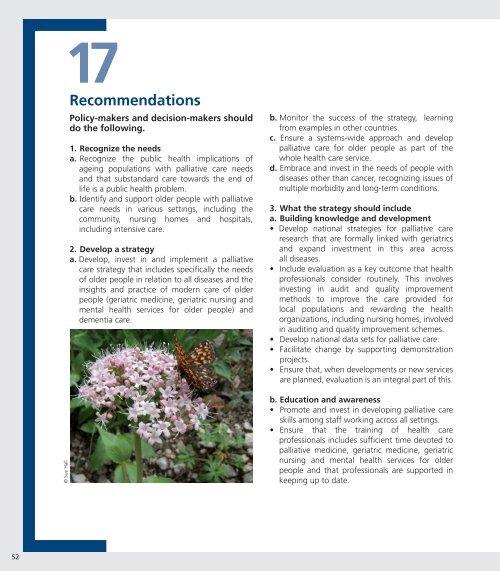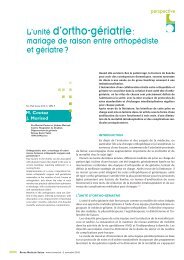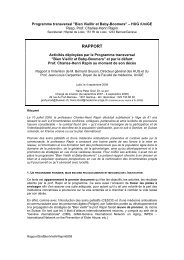Palliative care for older people - World Health Organization ...
Palliative care for older people - World Health Organization ...
Palliative care for older people - World Health Organization ...
You also want an ePaper? Increase the reach of your titles
YUMPU automatically turns print PDFs into web optimized ePapers that Google loves.
17© Sue HallRecommendationsPolicy-makers and decision-makers shoulddo the following.1. Recognize the needsa. Recognize the public health implications ofageing populations with palliative <strong>care</strong> needsand that substandard <strong>care</strong> towards the end oflife is a public health problem.b. Identify and support <strong>older</strong> <strong>people</strong> with palliative<strong>care</strong> needs in various settings, including thecommunity, nursing homes and hospitals,including intensive <strong>care</strong>.2. Develop a strategya. Develop, invest in and implement a palliative<strong>care</strong> strategy that includes specifically the needsof <strong>older</strong> <strong>people</strong> in relation to all diseases and theinsights and practice of modern <strong>care</strong> of <strong>older</strong><strong>people</strong> (geriatric medicine, geriatric nursing andmental health services <strong>for</strong> <strong>older</strong> <strong>people</strong>) anddementia <strong>care</strong>.b. Monitor the success of the strategy, learningfrom examples in other countries.c. Ensure a systems-wide approach and developpalliative <strong>care</strong> <strong>for</strong> <strong>older</strong> <strong>people</strong> as part of thewhole health <strong>care</strong> service.d. Embrace and invest in the needs of <strong>people</strong> withdiseases other than cancer, recognizing issues ofmultiple morbidity and long-term conditions.3. What the strategy should includea. Building knowledge and development• Develop national strategies <strong>for</strong> palliative <strong>care</strong>research that are <strong>for</strong>mally linked with geriatricsand expand investment in this area acrossall diseases.• Include evaluation as a key outcome that healthprofessionals consider routinely. This involvesinvesting in audit and quality improvementmethods to improve the <strong>care</strong> provided <strong>for</strong>local populations and rewarding the healthorganizations, including nursing homes, involvedin auditing and quality improvement schemes.• Develop national data sets <strong>for</strong> palliative <strong>care</strong>.• Facilitate change by supporting demonstrationprojects.• Ensure that, when developments or new servicesare planned, evaluation is an integral part of this.b. Education and awareness• Promote and invest in developing palliative <strong>care</strong>skills among staff working across all settings.• Ensure that the training of health <strong>care</strong>professionals includes sufficient time devoted topalliative medicine, geriatric medicine, geriatricnursing and mental health services <strong>for</strong> <strong>older</strong><strong>people</strong> and that professionals are supported inkeeping up to date.52
















